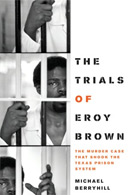The Trials of Eroy Brown: The Murder Case That Shook the
Texas Prison System

Author: Michael Berryhill
Austin, TX: University of Texas Press, 2011. 244p.
Reviewer: Jordan Rubin | January 2012
In the prologue to The Trials of Eroy Brown: The Murder Case That Shook the Texas Prison System, author Michael Berryhill observes, “[t]hat a black inmate could kill two white officials and not be convicted of murder shocked the prison system and marked the end of Jim Crow justice in Texas.” Unfortunately, Berryhill’s declaration of the demise of Jim Crow justice in the Lone Star State is hyperbolic. More importantly, however, he succeeds in letting Eroy Brown’s compelling story speak for itself.
Berryhill meticulously gleans the history of the case, using courtroom transcripts, news accounts, trial exhibits, witness statements -– anything he can get his hands on to more accurately and fully document Brown’s legal odyssey. The author’s dedication to his subject is apparent from the start, when he visits Brown in prison (where Brown is currently serving time for a crime he had committed after his acquittals that are the subject of this book). Berryhill presents Brown, today, as a wistful, older man, with a salt and pepper beard, resembling Danny Glover, the avuncular movie star. He goes on to detail the lengths to which Brown’s lawyers went to represent him, enduring personal and financial hardship to try a case they believed in.
Yet, Berryhill lends an air of humanity to the prison officials, too. He portrays Warden Pack, one of Brown’s alleged victims, somewhat sympathetically; recounting the day of Pack’s death, Berryhill notes that he was close to retirement, reminding the reader that Pack’s demise was not inevitable (no matter whose fault it was), and that “[a] Texas warden was always on call[,]” assuring the reader unfamiliar with prison life -– particularly prison life in Texas -– that he knows nothing about the world Pack lived in. Similarly, depicting the killing of Billy Moore (the other white prison official), Berryhill describes Moore’s brother running, falling to the ground, and hugging his lifeless brother as he shouts and cries out. It’s harder to hate someone who is loved.
Berryhill engages the reader by employing pop culture references relevant to Brown’s case: Nixon’s resignation, Vietnam, Dr. King’s speeches (one of Brown’s lawyers told the jury, “No lie can live forever”) and assassination, and folk singer Pete Seeger’s visit to the prison, to name a handful. He effectively identifies the obvious parallels between African slavery in the U.S. and the Texas prison system, and, employing that backdrop, potently casts Brown’s legal battle as the trial of a black field slave against his white master, with the black house slaves testifying against him.
Throughout, Berryhill does not hide his feelings about the case, confessing his belief in Brown’s innocence on the second page. He sets the stage for a reader who possesses even an iota of compassion to want Brown acquitted, despite the role that he played in the deaths of two men. Maybe we want Brown acquitted because of his upbringing (his mother was imprisoned for murder, among other features of a severely broken home), or the abusive manner in which the Texas prisons were being run; maybe it’s both, or something else. Maybe we just want to see the bad guys lose, regardless of who wins.
That leaves Berryhill’s claim that Brown’s acquittals marked the end of Jim Crow justice in Texas. Sadly, this is not true; the anecdotal evidence is too vast to recount here. Suffice it to say that a state whose governor recently bragged about the number of death warrants he’s signed has hardly done away with “Jim Crow justice.” The State’s recent efforts to shirk its obligations to minority voters under the Voting Rights Act does not help its cause, either. Finally, there is the small matter of Brown sitting in prison at this very moment, due to a draconian habitual offender statute, and the parole board that clearly holds a grudge against him for getting two of their own. The white master still wields power over the black field slave.
But we should not miss the trees for the forest. It would be wrong to quibble over the broader implications of Brown’s acquittals at the expense of appreciating their occurrence. Craig Washington, the most silver-tongued of Brown’s advocates, reminded the jury -– in the words of Dr. King -– that the arc of the moral universe is long, but it bends toward justice. To occupy a space on that long arc, as Brown’s case surely does, is monumentally important in and of itself. To document this critical progression in the moral universe of the Texas prison system, as Berryhill skillfully does, is to play a part in the ongoing effort to bring down Jim Crow justice in Texas.
Jordan Rubin is a third-year law student at Rutgers School of Law – Newark.


